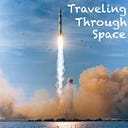Why Care About Space — Series Finale
Curiosity Is A Choice
In this mini-series, we have talked about how interest in space has played out in the past, is helping us lead better lives now and will continue to be a frontier of scientific collaboration. Let’s wrap up by talking about our connection to the Universe and why caring about it still remains our choice.
Deeper Connection 🧬
Humans are hard-wired to think of ourselves as separate. But one simple reason to care is that we are part of the Universe.
After our initial stumbles, we finally agreed that Earth goes around the Sun. We also know that our Sun is dragging us on a 483,000 miles per hour journey through the suburbs of the Milky Way galaxy. And the Milky Way in turn is dancing around its local cluster of galaxies spread across unimaginable distance.
In fact, our connection can be traced further back. We now understand that our Sun is at least a 3rd generation star. That means we are connected to the cosmos by the elements in our bodies, like gold and iron, that were forged in the heart of dying stars. So (with a healthy ego this time) there’s nothing ordinary about us — we are Stardust.
If you’re a farmer, a gardener, a UV-ray enthusiast, nature lover, cell phone user, astrologer or love all things Moon, you already care about your connection to the rest of cosmos!
Our Choice 🗳️
For all the reasons that exist, one inescapable fact remains — we’re already going to space. This is evident in the frequency of regular launches and ambitious goals put forward by both private & public enterprises.
Things are actually moving at a breakneck speed. SpaceX alone is launching missions every week. Public missions aren’t staying behind either. Just take a sample from most recent headlines— ISRO became the first to reach Moon’s south pole, NASA returned samples from an asteroid billions of miles away and astronomers, using data from the JWST, have identified carbon dioxide on Jupiter’s icy moon Europa, raising hopes for life outside of Earth.
Do we have a say in this new reality? Well we can either let some lobby group come up with a reason to continue or we can collectively choose our path forward.
Wrapping Up 🎁
It comes down to this question— can we be more curious about the world around us? As the scientific community shows us, curiosity is the first step in discovering how our world actually works.
So, the end of this series aren’t more convincing words, but a few questions for you to ponder upon—
- How many appliances can you identify around your house that are working on non-visible light? Microwave, oven, phone, TV, remote control, dryer. With that knowledge, do you see the world any different?
- Or something not even ChatGPT can answer — What is time? Is it something fundamental like matter & space around us, or is it just a human construct that helps us order things from past to the future. Believe it not, this is a deeper question than you might think.
